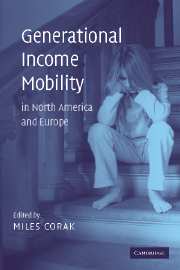Book contents
- Frontmatter
- Contents
- List of figures
- List of tables
- List of contributors
- Preface
- 1 Generational income mobility in North America and Europe: an introduction
- 2 A model of intergenerational mobility variation over time and place
- 3 Equal opportunity and intergenerational mobility: going beyond intergenerational income transition matrices
- 4 Intergenerational mobility for whom? The experience of high- and low-earning sons in international perspective
- 5 What do trends in the intergenerational economic mobility of sons and daughters in the United States mean?
- 6 Changes in intergenerational mobility in Britain
- 7 Intergenerational mobility in Britain: new evidence from the British Household Panel Survey
- 8 Non-linear patterns of intergenerational mobility in Germany and the United States
- 9 Family structure and labor market success: the influence of siblings and birth order on the earnings of young adults in Norway, Finland, and Sweden
- 10 New evidence on the intergenerational correlation in welfare participation
- 11 Intergenerational influences on the receipt of unemployment insurance in Canada and Sweden
- 12 Unequal opportunities and the mechanisms of social inheritance
- Index
- References
6 - Changes in intergenerational mobility in Britain
Published online by Cambridge University Press: 22 September 2009
- Frontmatter
- Contents
- List of figures
- List of tables
- List of contributors
- Preface
- 1 Generational income mobility in North America and Europe: an introduction
- 2 A model of intergenerational mobility variation over time and place
- 3 Equal opportunity and intergenerational mobility: going beyond intergenerational income transition matrices
- 4 Intergenerational mobility for whom? The experience of high- and low-earning sons in international perspective
- 5 What do trends in the intergenerational economic mobility of sons and daughters in the United States mean?
- 6 Changes in intergenerational mobility in Britain
- 7 Intergenerational mobility in Britain: new evidence from the British Household Panel Survey
- 8 Non-linear patterns of intergenerational mobility in Germany and the United States
- 9 Family structure and labor market success: the influence of siblings and birth order on the earnings of young adults in Norway, Finland, and Sweden
- 10 New evidence on the intergenerational correlation in welfare participation
- 11 Intergenerational influences on the receipt of unemployment insurance in Canada and Sweden
- 12 Unequal opportunities and the mechanisms of social inheritance
- Index
- References
Summary
The extent to which children's economic or social success is shaped by the economic or social position of their parents is a contentious and hotly debated issue, both within academic circles and in a wider policy context. There is a large body of academic work, carried out predominantly by sociologists, on social mobility – where social class of individuals is related to parental social class – and a smaller body of work which considers mobility in terms of economic status (usually measured by labor market earnings of children and parents). An example of the former is the survey undertaken in the Performance and Innovation Unit (2001) paper on social mobility, while Solon (1999) offers an overview of the latter. Further, the issue of intergenerational inequalities crops up in the political arena time and time again, and one increasingly sees discussion of the issue in the political press.
The experiences of the last twenty years or so probably make such issues even more relevant than ever. In the United Kingdom income inequality increased very rapidly since the late 1970s (Goodman, Johnson, and Webb 1997). Much of this has been due to changing rewards from paid work as earnings gaps between the highest- and lowest-paid workers widened out by a considerable amount (Machin 1996, 1998, 1999). One consequence of this has been a massive rise in the proportion of children growing up in poverty.
- Type
- Chapter
- Information
- Generational Income Mobility in North America and Europe , pp. 122 - 146Publisher: Cambridge University PressPrint publication year: 2004
References
- 124
- Cited by



